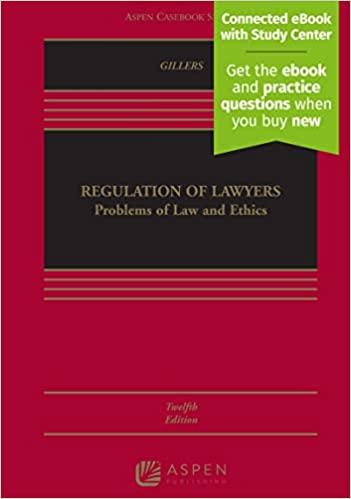Question
After reviewing the article below, discuss the following questions; Should the law be changed to hold sellers legally accountable for the often-exaggerated opinions and promises
After reviewing the article below, discuss the following questions;
- Should the law be changed to hold sellers legally accountable for the often-exaggerated opinions and promises that they make to customers? Why or Why Not?
- In your opinion, would such a change in the law create even greater problems?
The Debate over Puffery
The term puffing refers to a salesperson's exaggerated claims as to the quality of goods offered for sale. Puffing is considered a statement of opinion and not a statement of fact, and therefore it does not constitute an express warranty.The law assumes that most buyers or lessees know, or should know, that sellers and lessors traditionally have engaged in "huffing and puffing" their wares, and that reasonable buyers and lessees will not be "taken in" by this puffery. Some customers do not recognize the difference between puffery and statements of fact, however.This problem is exacerbated when customers do not have a complete command of the English language and are taken in by fast-talking salespersons.
Should sales representatives be held accountable for the promises they make to their customers?
Some legal scholars have suggested that they should be.Others, though, point out that changing the law relating to puffery could lead to further problems.Almost any innocent remark made by a sales representative could conceivably become the basis for litigation.For this reason, at least to date, the National Conference of Commissioners on Uniform State Laws has not opted to change the UCC provisions relating to puffery.In the meantime, the courts must distinguish between statements that amount to mere puffery and statements that constitute express warranties or misrepresentations of material facts.
Puffery v. Express Warranties
The line between statements that amount to puffery and statements that constitute express warranties is not always clear.For example, in one case a tobacco farmer had read an ad stating that Chlor-O-Pic was a chemical fumigant that would suppress black shank disease, a fungal disease that destroys tobacco crops.The ad specifically indicated how much of the product should be applied per acre and stated that, if applied as directed, Chlor-O-Pic would give"season-long control with application in fall, winter, or spring."The farmer bought eight thousand pounds of Chlor-O-Pic and applied it as directed to 143 acres of his tobacco crop.Nonetheless, the crop developed black shank disease, resulting in an estimated loss of three thousand pounds of tobacco per acre.
Were the representations made in the ad mere puffery?
Did the manufacturer have a duty to disclose in the ad that several applications of Chlor-O-Pic may be required to prevent black shank disease?
When the farmer sued the manufacturer of Chlor-O-Pic, he argued that he had purchased the product in reliance on what he assumed to be a "strong promise" of "season-long control."In this case, the jury agreed with the farmer.The manufacturer had indeed made a strong promiseone that created an express warranty.
Puffery v. Misrepresentation
The line between puffery and fraudulent misrepresentation is also not always readily discernible. For example, in one case, a sales representative for a Mazda dealer was trying to sell a used Mazda to Kevin Garrett. The salesperson said that although the car had nearly 15,000 miles on it, the salesperson himself had used the car as a demonstrator and for his personal use and had "babied it to death." In fact, the car had been stolen from the dealer and driven 10,000 miles, and prior to the theft, the dealer had had to replace the engine after the car had been driven only approximately 3,000 miles.
Had the sales representative committed fraud?
Did he have a duty to disclose that the car had been stolen?
When Garrett later experienced numerous problems with the car and eventually sued the dealer, the court held that the theft of the car was a material fact and that the salesperson had a duty to disclose this information. According to the court, the statements made by the salesperson crossed the line between puffing, or "seller's talk," and misrepresentation.
Step by Step Solution
There are 3 Steps involved in it
Step: 1

Get Instant Access to Expert-Tailored Solutions
See step-by-step solutions with expert insights and AI powered tools for academic success
Step: 2

Step: 3

Ace Your Homework with AI
Get the answers you need in no time with our AI-driven, step-by-step assistance
Get Started


